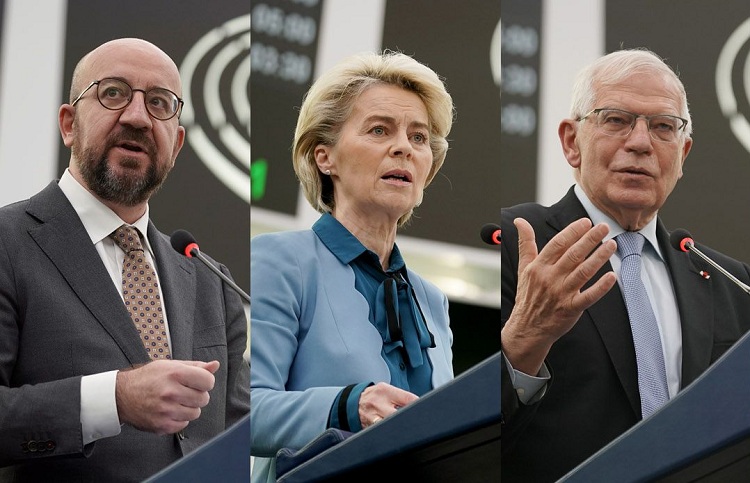The Diplomat
The President of the European Council, Charles Michel, has taken advantage of the presence of all the European leaders -including the President of the Government, Pedro Sánchez- in Brussels on the occasion of the EU-AU Summit to call for today an extraordinary summit on the crisis in Ukraine.
“The very serious situation in Eastern Europe has crept into all our agendas,” said Charles Michel yesterday during an appearance of the top leaders of the European Union before the European Parliament to express their support for Ukraine. Therefore, Michel has taken advantage of the presence of the 27 European leaders in Brussels on the occasion of the EU Summit with the African Union, scheduled for today and tomorrow, to organize this extraordinary summit that will serve to “express the firmness, unity and strength of Europe to defend our values and stand by the Ukrainian people”. The informal European Council on the situation in Russia and Ukraine will begin at 12:30, about two hours before the opening of the 6th European Union-African Union Summit, which brings together European and African leaders, according to Moncloa.
Likewise, the President of the Council warned that, apart from reaffirming the sovereignty and territorial integrity of Ukraine, the EU must help this country financially “because the circumstances are already causing significant daily damage to the Ukrainian economic system”. Therefore, he expressed his “satisfaction” for “the quick decision” of the Commission to grant financial assistance to Ukraine of 1.2 billion euros, which was approved yesterday by the European Parliament, and announced the launching, “in close cooperation with Ukraine and the European Union”, of “a donors’ conference to support Ukraine’s economic soundness” and to “support the reform agenda that is so important for this country”.
At the same event, EU High Representative for Foreign and Security Policy Josep Borrell said that “what happens in Ukraine will shape the future of humanity.” “All human beings should be concerned about what happens there, because if once again the law of the strongest is imposed and one country can threaten another and can attack it and disintegrate it territorially, we will go backwards in history,” he continued.
For her part, Commission President Ursula von der Leyen declared that “diplomacy has not yet said its last word” and insisted that the signs of détente announced this week by the Kremlin must be followed by concrete actions, because “NATO has not yet seen signs of a reduction of Russian troops.” Von der Leyen also warned Russia that it should not use the energy issue as a weapon because, thanks to the boost from other energy sources, “we are safe this winter.” “One of the lessons we can already draw from this crisis is that we must diversify our energy sources to get rid of dependence on Russian gas and bet heavily on renewable energies,” she added.
NATO awaits “a response from Russia” to its security proposals
On the other hand, the NATO Headquarters in Brussels hosted yesterday the meeting of the North Atlantic Council of Defense Ministers -including the Spanish Minister, Margarita Robles- to discuss, among other issues, the situation in Ukraine.
During the meeting, which was chaired by the Secretary General of the Alliance, Jens Stoltenberg, the ministers defended the “twin-track approach towards Russia”, based on “strong deterrence and defense, combined with openness to dialogue”, and assured that they have presented “substantial proposals to Russia to improve the security of all nations in the Euro-Atlantic region” and, therefore, are awaiting “a response”. “We have repeatedly offered, and continue to offer, further dialogue through the NATO-Russia Council, and we stand ready to engage. We strongly encourage Russia to reciprocate and choose diplomacy and de-escalation,” they warned.
“Russia’s actions pose a serious threat to Euro-Atlantic security and, accordingly, and to ensure the defense of all Allies, we are deploying additional ground forces in the eastern part of the Alliance, as well as additional maritime and air assets, as announced by the Allies (with battalions in Romania and Bulgaria, which would add to those already operating in Poland and the Baltic countries),” the ministers continued. “Our measures are and remain preventive, proportionate and non-escalatory. We are prepared to further strengthen our defensive and deterrent posture to respond to all contingencies,” they assured.
Margarita Robles
In this regard, Margarita Robles declared yesterday in Brussels that Spain does not plan, “in principle”, to reinforce its military presence in the area. “We have emphasized that Spain has already brought forward the commitments it already had and Bulgaria has thanked us for the presence of Eurofighters in the Black Sea”, she explained. The main Spanish military contingent in the region is made up of 350 Spanish troops deployed in Latvia in the framework of the Enhance Forward Presence (eFP) mission deployed by NATO to guarantee security on the Eastern flank of Europe.
Likewise,, the minister stated that no “Russian de-escalation” is discernible. “It is true that there has not been an invasion that had been talked about, but the threat of invasion is there.” In any case, he stressed the “unprecedented” unity in NATO in this crisis and continued to claim the path of dialogue and diplomacy with Russia.






